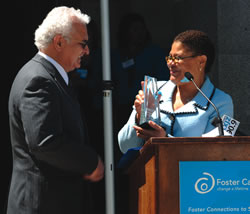

Panel urges key reforms in foster care system
Carlos Moreno knows first-hand the challenges of navigating California’s foster care jungle. For more than nine years, the associate justice of the Supreme Court and his wife have been caregivers and foster parents to their niece, Heather. Their experience, he says, has been a driving force in his work as chair of a commission appointed in 2006 by Chief Justice Ronald George to review the courts’ role in foster care. Last month, the commission issued its final report, calling for fundamental reforms in juvenile dependency courts, extended support for foster youth until age 21, reduced caseloads for judges, lawyers and social workers, and a bigger priority on resources for foster youth. In addition, the commission urged each county to form local foster care commissions, a recommendation Moreno characterized as a “linchpin” in reform efforts. Noting that nearly half of California’s foster children have been in care for more than two years and 17 percent for more than three years, Moreno said the urgent need for action cannot be overstated. “Too often these children find themselves in foster care limbo, shifted from placement to placement, and separate schools,” he said. Progress already has been made on some of the recommendations. California approved legislation last year to ensure that foster youth can participate in their dependency court hearings; recent federal legislation advances 20 of the commission’s recommendations, including increased support for relative caregivers and continued support for foster youth until age 21; and the California Judicial Council has made improvements in foster care one of its four top priorities this year. Moreno urged immediate enactment of legislation pending in Sacramento to extend support to foster youth until age 21. Currently, foster children “age out” of the system when they turn 18. “None of us would allow our own children to be without support — and certainly we should not allow this to be the case for our foster youth,” Moreno said. Despite some progress, daunting challenges remain. The commission found that the court and child welfare system is plagued by staggering caseloads, insufficient and rushed hearings, lack of adequate information for judges to make informed decisions and other barriers that prevent children and their families from participating in crucial decisions. The panel, made up of judges, legislators, child welfare administrators, foster youth, caregivers, parents, philanthropists, tribal leaders and children’s advocates, placed an emphasis on kin, recommending that families be involved earlier in the process and that there be greater flexibility in approving placements with relatives. It also urged that children and parents have an opportunity to be present at and heard during dependency court proceedings and that foster children “go to the head of the line” when resources are allocated. Further, the Judicial Council should advocate reasonable caseloads for courts, attorneys and social workers, who often manage caseloads that are two to four times the recommended levels. • The commission’s report and action plan is available at courtinfo.ca.gov/blueribbon, or can be ordered by calling 415/865-7739. |
||||||||
|
||||||||
